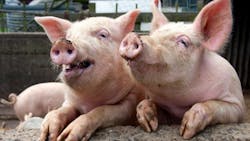Swine Waste-to-Energy Facility Opens in North Carolina
The largest swine waste-to-energy system operating at full capacity, located at the Storms Hog Farm near Bladenboro, North Carolina, celebrated its opening last week.
The 600 kW plant has been in near constant operation since it came on line October 4, 2013, and has sustained peak or near peak output for the past 90 days.
The 600 kW facility, operated by Storms Hog Power, evolved from a grant for four swine farm renewable energy pilot projects administered by the NC Department of Energy, applied for in May of 2010 by Sam Ravenel, of Withers & Ravenel, and Dr. Garth Boyd, of The Prasino Group.
The facility is the combined efforts of Dr. Boyd who formed AgPower Partners LLC (APP) to develop the Storms project and enlisted DVO Inc. for its patented Two-Stage Mixed Plug Flow anaerobic digester and Martin Machinery/GenTec for its biogas engine/generator turn-key services. William R. Storms is the farm owner and operator.
Storms Hog Power anaerobic digester and renewable energy generating system, in tandem with an enhanced animal waste extraction and collection system that uses scrapers instead of flush water to remove manure from the houses, greatly reduces the negative environmental impacts of the current lagoon and spray field manure management systems, while profitably generating renewable energy and other valuable byproducts.
Manure collected daily from nearly 30,000 hogs, formerly treated in open air lagoons, mixed with off-site agricultural wastes which were previously either land applied or destined for a landfill, is biologically decomposed in an oxygen-free, 1.2 million gallon reinforced concrete vessel. The bacteria in the digester metabolically break down the organic waste streams and generate energy-rich biogas, while destroying nearly all of the pathogens and odor. The biogas is combusted in an engine/generator, sending enough clean renewable electricity to the local utility to offset the electricity consumption of nearly 300 average size homes in the area.
“What is really amazing is what you don’t see or actually, smell,” said Jeff Smerko, managing principal of AgPower Partners said. “Spending the better part of the past two and a half years down here, I thought that I had just grown accustomed to it. But that’s not it. The odor now is virtually gone.”
“Anaerobic digestion presents many benefits far beyond power generation,” said Steve Dvorak, owner and founder of DVO, Inc. “For progressive hog farmers, it’s also about being a good steward of the land. Our digesters reduce greenhouse gas emissions from stored and land-distributed farm wastes by roughly 90%. Pathogens in farm waste, including e-coli and salmonella, are reduced so much that they are almost undetectable, and our new nutrient recovery technologies allow for the practical removal of additional phosphorus and ammonia nitrogen. We’re excited to have been a part of this project and look forward to helping more farmers like Billy and their communities benefit from anaerobic digestion.”
The govenrment provided legislative assisance. "The North Carolina Senate Bill 3, mandating that utilities have swine generated electricity as a small part of their total portfolio, enabled farmers like Storms to try something that would have been untenable without the incentive,” commented Jonathan Gross, partner at CohnReznick LLP. “The team that developed Storms Hog Power has overcome bureaucratic and modeling challenges to make the project bankable. The end result is a model that makes sense, that works – and that can be repeated.”
North Carolina Electric Membership Corp. purchases all of the electricity under a long-term contract. This revenue, combined with tipping fees for processing the off-site agricultural waste, the sale of the carbon credits and Renewable Energy Certificates, and the sale of other valuable byproducts, support the sustained operation and maintenance of the facility.
